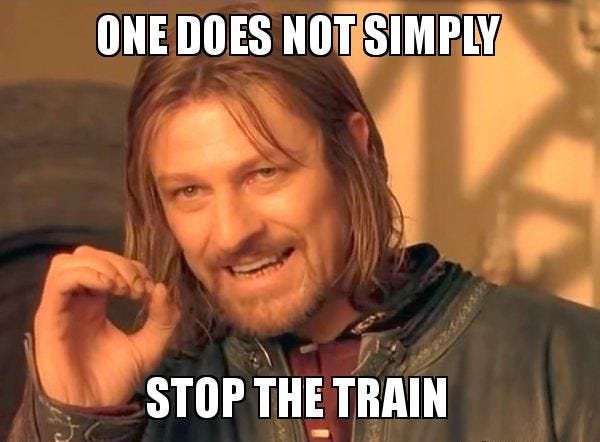The suspense is palpable. The “big one” is just around the corner and we can feel it. About time too because the sequel to The Grapes of Wrath is eighty years overdue. Soon, we’ll all be members of the Joad family.
The hallmark of a depression is severe deflation caused by a sudden contraction in liquidity. In simple terms, there are not enough cash buyers to support contemporary market prices. Just imagine today if no one could buy anything on loan.
Cars, homes, education; all these things would become less accessible to most people. If there are no bidders for these goods and services, then prices collapse. When prices collapse, so do the companies dependent on stable prices to remain profitable. As go companies so go the job opportunities. This is the genesis of a depression.
Sadly, humans are capable of destroying economies in even more creative ways. We tend to be the most fearful of things we know we should be fearful of. Statistically, you’re less likely to be murdered by a stranger than by your own spouse. I didn’t even realize I was supposed to be afraid of my wife but now my guard is up.
So, we conclude that depression is the real monster in the closet and prepare for it accordingly. Is there any wonder why Costco can’t keep their 1 oz Gold Bar PAMP Suisse Lady Fortuna Veriscan’s in stock? Seems like I’m in the wrong business.
The economic pain felt acutely today, sending a tsunami of discontent throughout the West, is opportunity asymmetry. The bifurcation of those with means and those without has been accelerating without resistance. Discontent naturally gives way to division as tribes band together to put a finger on what exactly is causing society’s general anxiety disorder.
Ironically, most of these tribal groups have the same end goal in mind: human thriving. In a world where everything seems to be at stake, ideologies calcify and thought elasticity suffers. The result is a governance divide that refuses to address its long-term challenges.
As I’ve always said, money is apolitical. It doesn’t care anymore than a honey badger. Your investment strategy should not maintain a political affiliation. We do not know exactly what the world will look like tomorrow, but we can assess the current trajectory and act on reasonable assumptions.
Assumption 1: the US government is unlikely to meaningfully cut spending.
Assumption 2: policymakers will prefer to use inflation, which is an obfuscated form of taxation, over explicit tax increases to fund deficit spending.
Assumption 3: accelerating financial asymmetry will divert inflation to financial assets.
Assumption 4: liquidity events will be addressed with aggressive central bank action.
More assumptions could be drawn but these will suffice to make my point, and that is you should own stocks if you value your wealth. For the typical US citizen, most assets are likely valued in dollars. Understand, and this is critical, that these dollars are not fixed. While your bank statements display stable values, Kroger disagrees with this notion of stability. What does this have to do with the price of bread? Everything.
As the tribalists fisticuff each other like a couple of kids in the back of the station wagon, mom and dad accelerate down the deficit highway to Wally World. Tickets are expensive and the station wagon is a gas guzzler. Better call Uncle Sam to see if there are any loans available.
When the Treasury auctions debt, primary dealers buy bonds under mandate and resell them to investors. When there exists more debt to sell than demand, rates must go up to attract more buyers. If rates go too high, the temptation is for the central bank to step in to fill the demand gap, a process known as “Quantitative Easing” or “QE”. It’s a nicer way to say “financial repression” which is exactly what QE is.
The net effect is lower interest rates at the expense of currency strength. In other words, your dollar will buy less and less the more this goes on. As deficits grow, the QE necessary to properly administer financial repression increases. This can lead to some whacky consequences, one of which is wealth concentration. Wealth inequality diverts inflation into financial assets. There are only so many yachts billionaires can use at the same time.
I do not gamble so I hesitate to use the word “bet”. However, some bets are just smart, like betting on what direction a train will head. The fiscal policy of the US is a train heading one direction and the smart money play is to own natively scarce assets with utility. The more dollars that are created, the higher the demand for places to park them.
Stock investing isn’t for the faint of heart. Easy liquidity invites short-term speculators which can lead to extreme distortions in values. It’s disheartening to buy a stock fund only to see it fall in value a short time later. For many, it’s just too much.
But if you want to run a successful long-term wealth building strategy, you must be a long-term equity investor. This is especially true today as we face unprecedented levels of sustained deficient spending inviting an inflationary response.
There will be selloffs. We could have one next week, for all I know. When the chips are down, look no further than the assumptions above to find the confidence needed to stay rational. I maintain optimism that we’re close to the end of this bear market cycle but cannot predict irrational swings. Keep invested and stay focused. I’ll add colorful commentary in the meantime.
The opinions voiced in this material are for general information only and are not intended to provide specific advice or recommendations for any individual.
Securities offered through LPL Financial LLC. Member FINRA/SIPC. Advisory Services offered by National Wealth Management Group LLC, an SEC Registered Investment Advisory and separate entity from LPL Financial LLC.









